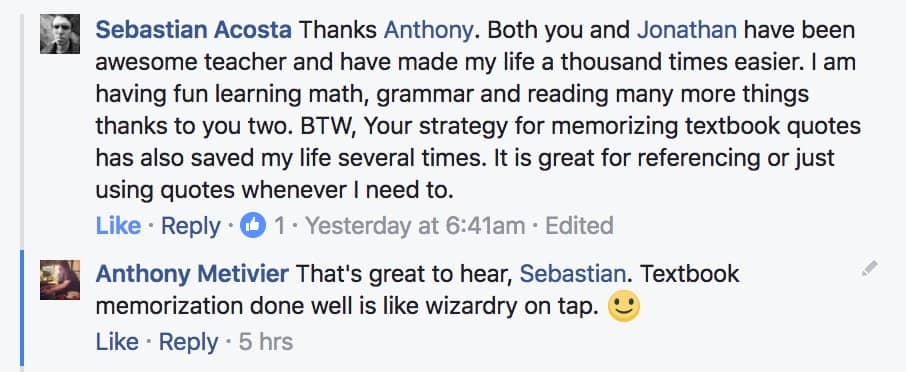Podcast: Download
Subscribe: Apple Podcasts | RSS
 Have you ever sat down to learn faster with some new accelerated learning technique and thrown your hands up in the air?
Have you ever sat down to learn faster with some new accelerated learning technique and thrown your hands up in the air?
No, not to catch a balloon or give a salute.
But because you were furious and frustrated?
And have you felt that a learning process was so hard that you just wanted to give up?
I hear you!
After all, I’ve put some of the toughest learning challenges in front of myself all the time.
I’ve studied languages like Biblical Hebrew, German, Chinese for my work as a university professor. Personally, I’ve also memorized over 100 verses of Sanskrit while learning an ancient philosophy in that language.
Then there are the musical instruments I’ve learned like trombone, sitar and bass.
Plus I’ve used my ability to learn new skills at laser-fast speeds to help me run the memory website you’re reading now:
Hands-on mechanical tasks like figuring out how to spread the good news about memory techniques with videos, blogs and podcasts.
And in all cases, it takes grit and mental strength.
It takes tenacity.
Above all, success with learning quickly takes these…
4 Secret Ways To Make It So Easy
You Can Run Circles Around Everyone Else!
If you’re interested, I’d like to share these 4 secrets with you, plus another 4 in this video:
All I ask is that you read everything carefully and give at least ONE of these insights from my experience a serious try.
But let’s be clear:
Trying just one would be good. But …
50% would be great.
100%? …
Why that would be downright Magnetic!
1. The Most Powerful Question Any Learner Can Ask
One of the reasons some people find learning new skills so painful is that they don’t ask simple questions.
It’s a question that, when applied often, can unlock the nuclear power needed to drive you through some of the hardest missions in life.
It’s a question almost no learner asks.
Probably because it’s a bit tough for most people to wrap their heads around.
It sounds kind of selfish, after all.
The question is:
“What’s in it for me?”
But even if it has a selfish angle to it, this question is so important.
Why?
Because So Many Learners Are Trying To
Accomplish Outcomes For Everyone But Themselves!
Think about it:
You go to school and learn things to please the machine …
You get a medical degree to appease your family …
You study a language because it’s part of a degree …
Nothing wrong with any of that, unless …
None Of It Has To Do With What
You Authentically Want In Life!
And so it’s little wonder learning feels hard. If you’re the last person who gets a kick-back for all that effort, it’s always going to feel like you’re trying to chew through a brick wall.
Make it easier on yourself by learning something that has a definite payoff for the number one person that matters: You.
Because here’s the plain truth:
You’re a good person.
You want to serve others.
And you can change the world.
But it will never happen if you secretly hate the learning process because it just doesn’t serve your needs first.
Want a fast and easy way live authentically? Practice gratitude:
2. Why Comatose Zombies Can
Outlearn The Flash Any Day
Okay, that sub-headline might be a bit misleading.
What I mean to say is that you need to relax to learn.
Because here’s a fundamental truth:
Information flees from tension. But it’s Magnetically attracted to relaxation.
Let me say that again:
Information flees from tension. But it’s Magnetically attracted to relaxation.Click To TweetAnd the more you know how to relax your brain, the more information will want to stick around. You’ll be able to slosh it around the mouth of your mind like fine wine and actually enjoy it for a change.
And what you enjoy… ?
Pleasure Is Instantly Easier To Remember!
The trick you need to understand when it comes to relaxing your mind is this:
Your mind is produced by your brain.
Your brain is a physical entity.
And that’s what makes the Memory Palace technique so powerful:
It’s something physical out in the world being used physically inside your material brain.
Don’t know how to make a Memory Palace? No problem…
And to get the most of the training, relax your mind each time before you use your memory.
That said, never try to relax your mind without relaxing your body first.
In fact, it’s very likely that the only way to truly relax your mind is by relaxing the body first.
So the next time you sit down for a study session, stretch a little first.
One way I like to do that is by mind mapping. My friend Joseph Rodrigues is a great source for learning how to use the technique to get into a state of flow.
Meditate.
Focus on your breathing. Just 5 minutes a day, 4 times a week is scientifically proven to create better memory.
Attention paid to breathing will lower most of your resistances to learning and make everything easier.
You don’t have to take my word for it. The Australian Education Research Organisation has summarized many research findings and tips based on the fact that people who manage cognitive load learn better.
You can also use your meditation time to walk through the Memory Palace Networks you create. As memory expert Boris Konrad has explained, active recall is essential for memory formation. What better way to practice it than when you’re already using meditation to stack the chips in your favor?
3. Understand That The Map Is Never The Territory –
But Maps Sure Do Help!
When I created this Infographic and Podcast episode giving you a deeper understanding of how to realistically memorize a textbook, I had no idea people would find it so practical and useful.
After all, everybody asks me for “tips and tricks” that will let them memorize entire books.
But the truth is that this feat is rarely necessary. In fact, it’s probably never necessary.
But if you use the techniques I teach in that podcast to get a global overview of the books you need to read faster, you’ll have a map. This map will set the stage for your experience of the territory.
And that will give you laser-targeted tools for remembering the parts that matter. Proof:
When you can do that, you do better than just learn and remember. You also create new knowledge.
And when you create knowledge, the speed at which you can learn grows exponentially. It feels good, creates energy and encouragement and keeps you on the path of continual growth.
Nothing difficult or painful about that.
4. The Magnetic Magnifying Glass Method
Have you ever heard the phrase, “you don’t know what you don’t know”? Tony Buzan mentioned it during our conversation some time ago on the Magnetic Memory Method Podcast.
If you want to make learning faster and easier, make sure to get yourself in orbit with that concept.
Why?
Because when you hold a magnifying glass to your own ignorance, you get real clear on what it is you need to learn. Without that clarity, it’s nearly impossible to make progress as a self-directed learner.
In other words, learning truly is hard and slow when you’re stumbling around blind in a cloud of unknowing.
But when you ask questions about what you know and don’t know about a topic, suddenly a lot of that fog is whisked away.
Want a simple exercise you can use for each and every learning project you ever undertake? I promise:
It’s easy, fun and speeds up everything.
It’s called:
Writing summaries.
Every time you take a class, attend a study session, read a chapter, watch a video or even use an app, take a quick second to jot down everything you can remember.
Then beneath that, start asking questions about what it is you think was covered … but mysteriously can’t remember. This will help train your selective attention abilities.
Then make two plans:
One plan for how you’re going to continue to remember what you remembered.
Another plan for what you’re going to do to fill in the gaps so that you can remember the information you think flew over your head.
Simple. Elegant. Easy and effective.
5. Apply Active Learning Techniques
When it comes to really getting your study materials to stick, there are many strategies you can pursue.
One of my favorites during university was to attend study groups. In these sessions with other serious learners, we practiced remembering what we learned so we could present the material to each other.
It’s kind of like peer teaching. It helps everyone reinforce understanding and promotes much deeper learning. That’s because it helps the brain engage in what scientists sometimes call active recall.
As you prepare for your group study sessions, use active reading. I’ve written an entire tutorial for you on how to read in this way.
6. Using Ancient Questioning Strategies
When you’re on your own, you can learn much more actively by using Socratic questioning. This ancient form of actively engaging with learning material involves asking open-ended questions to stimulate critical thinking. Scientists found during this study that students not only learned faster. They also felt better and fought off depression between learning sessions.
Long story short: question everything. It does more than merely helping you learn faster.
7. Spill Ink To Learn Faster
One of the reasons I did so well in grad school is that Professor Katey Anderson made me write a lot of summaries. Every week I had to show her at least five paragraphs about each book and article she had assigned me.
Make no mistake. This was a tough requirement.
But brainstorming my ideas after each reading session and then reflecting on what I found made everything stick much faster. And with substantial longevity too. I still remember an astonishing amount of what I learned.
Writing about what you’re reading also helps you quickly find the main points in articles. That’s because doing extensive writing yourself helps you develop stronger pattern recognition. You can navigate what others have written much better as a result of writing extensively too.
Why Most People Prefer A Life Based On Excuses
A lot of people will go through a post like this, nod yes to each and every point and then carry on with their lives of learning desperation.
The reason why this happens, beyond just a bad way of drawing from their episodic memory, is simple:
It’s all contained in point number one.
If you missed it and care about the life of your memory and your mind, go over it again.
And if you feel like you’re resistant to any of the wisdom contained in this post, review the second point I’ve made.
If anything on the planet raises your hackles, a few simple brain exercises that take just a few minutes of your time could be a game changer for you.
And if you’d like a realistic way to remember everything of importance in any book or posts like these you encounter in the world, here are 7 more powerful tips that show you how to improve memory for studying.
For the true Magnetic Knight, point four will be the most precious of all. There’s a little comment section below where you can complete this part of the exercise. I’ll be around to help you fill in any gaps I may have missed.
I look forward to hearing from you, and until next time, keep learning and keep yourself Magnetic! 🙂
Related Posts
- 5 Memorization Techniques That Help You Learn Faster
Memorization techniques can be confusing because there are so many. Knowing these 5 benefits will…
- Memorizing Short Texts To Learn Your Foreign Language Faster
This tip will help you pick up foreign language vocabulary fast ... assuming you're using…







24 Responses
Hello Anthony,
Thanks for the share. Learning anything faster doesn’t mean just hearing but listening. Hearing just brings the content to the ear, but listening sends it to the memory. Listening makes it what it is, what it is for me, and brings all the other required questions for saving in the memory.
Great point, Venu. Hearing and listening are definitely two different things. That’s why paying attention to information carefully is the first rule of memory.
Thanks for taking a moment to share your thoughts and bring this deeper level of clarification! 🙂
I like the content of the podcast. but I think you should put a search option on your site, so that I can look for previous podcasts and blogs easier
Thanks for letting me know you like the podcast. 🙂
The search bar is on the right navigation panel. It says “Search this website” and on desktop is visible beneath the “Recent Posts” feature box.
It also appears in this area on the mobile version, normally at the very bottom of the page.
Thanks for asking about it and do feel free to let me know what you’re searching for. Perhaps I can direct you better than a robot. 🙂
Hi Anthony,
The post is really very helpful for a student. Anyone who want to learn anything is considered to be a student. Thanks for the share, its also helpful for me. 🙂
Glad you found this useful, Sandeep.
And I agree: All who learn are students. 🙂
Anthony great podcast! Must say I am about to jump into learning a new technology and am overwhelmed by the book I need to read. However, this podcast alone has made me change my mindset indeed. FEAR is gone now 🙂
Thanks! Please send us more podcasts like these ones when possible.
Kgosi
SA
So glad to hear that, Kgosi. Thanks for listening to this episode of the podcast and letting me know it created an impact for you.
I think an episode that compliments this one that you might one to check out involves the truth about attention span. I think you’ll find it just as inspiring.
Thanks for taking a moment to post. I look forward to your next one!
I really liked the way you explained things. I am about to learn a new technique for learning faster.
Great to hear from you and thanks for posting.
Which technique in particular have you decided upon?
Hi,
I have this problem when I begin learning any language I give up after 3 or 4 courses.
Thanks for sharing this experience, Rabab.
Learning a language is about more than taking courses. You also want to make sure that you have at least one speaking partner, ideally more.
That’s what the Big 5 of Language Learning is all about.
If you haven’t gone through that video on this page, I suggest that you do. I think it will help you see the big picture and how memory techniques fit within it.
Hi. The podcast is very informative.I would like to try these techniques to remember faster. Actually I was searching for a guidance to learn faster and remember better.Thanks Anthony.
Glad you found this helpful, Anjana. What topics and areas of interests do you study? 🙂
Very helpful and educative. I’m deploying the two I have not been practicing.
Glad that you found this useful, Lanre. Which two were you using before?
Very informative and beneficial for students. Keep it up.
Will do, Zulfiqar. Thanks for posting!
You can learn faster by repetition This means you don’t need to memorize anything while learning.
When you try to remember you force your brain to do something it’s not ready to do at this moment. The secret most people don’t know is that the brain can remember itself without being forced to do so, but it has it’s natural way to do so.
If you try to memorize things and study hard, you are forcing your brain into learning and the effect is that you don’t learn well.
You can learn faster when you repeat a lot of times the information you need to remember without trying to remember it. This way your brain will absorb it in at an optimal, faster pace.
Thanks, Emmanuel, though there is a ton of evidence that speaks again your comment here.
For example, did your brain “naturally remember” the two typos you made in your post? Or did you “naturally” forget to edit your post?
(Don’t worry: I’m not a typo-crybaby. I make them myself, but am just making a point everyone needs to notice about your claim here.)
The whole idea of natural memory is as awkward as those who think memory techniques are artificial. If anything, it’s the other way around:
Memory techniques amplify the ways we naturally learn through association. Repetition, especially when done to excess without effect, is unnatural and cruel.
After all, they say that the definition of insanity is doing the same things over and over again and expecting a different result. And in this case, they royal “they” are quite right.
Thanks for taking the time to share your views on learning faster. Much appreciated! 🙂
Hi thanks for posting this podcast.i really thought of leaving education because i find it hard to study but the way you explain this podcast. i will like to go back to my education.thank you very much
I am glad you found this post helpful and wonderful that you want to stick with your schooling. I know you will be glad you did.
How can I help further to make it easier for you? Do you have any Memory Palaces yet?
Thanks
My pleasure!